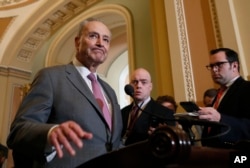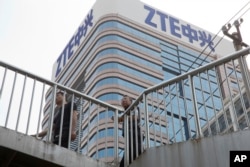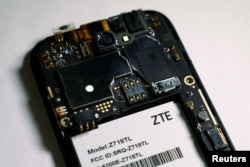Key U.S. lawmakers on Monday attacked President Donald Trump's call to help save jobs at the Chinese technology giant ZTE, contending it overlooks American national security concerns.
Sen. Marco Rubio, one of Trump's former rivals for the Republican presidential nomination in 2016, said on Twitter the "problem with ZTE isn't jobs & trade, it's national security & espionage. Any telecomm firm in China can be forced to act as tool of Chinese espionage without any court order or any other review process. We are crazy to allow them to operate in U.S. without tighter restrictions."
The Florida lawmaker added, "I hope this isn't the beginning of backing down to China."
Senate Democratic leader Charles Schumer parodied Trump's "Make America Great Again" political slogan, saying, "One of the few areas where the president and I agreed, and I was vocally supportive, was his approach towards China. But even here he is backing off, and his policy is now designed to achieve one goal: make China great again."
Democratic Sen. Ron Wyden questioned the timing of Trump's call to help ZTE "get back into business fast" after a U.S. trade ruling severely crippled the company and order to the U.S. Commerce Department "to get it done!"
"Unilateral concessions before an upcoming trade negotiation," Wyden said. "This may be the art of the deal for China, but it's a big loser for American workers, companies, and national security."
Trump said Sunday he is working with Chinese President Xi Jinping to ease the economic fortunes of ZTE, which employs 80,000 workers and is China's second-largest maker of telecommunications equipment.
The U.S. leader's Twitter comments on ZTE came as the United States and China, the world's two biggest economies, are locked in contentious talks about tariffs each has threatened to impose on hundreds of billions of dollars worth of each other's exports. Recent U.S.-China trade talks in Beijing proved fruitless, but the discussions are resuming again this week in Washington.
For its part, Chinese Foreign Ministry spokesman Lu Kang said Monday that China "greatly appreciates the positive U.S. position on the ZTE issue."
After Trump tweeted that he had "instructed" the Commerce Department to resolve the dispute over ZTE, the White House said that the president expected Commerce Secretary Wilbur Ross to make an independent decision.
"Too many jobs in China lost," Trump tweeted Sunday, days after ZTE announced it had ceased "major operating activities."
The U.S. had cut off exports of U.S.-made parts to ZTE — more than 25 percent of the components ZTE needs to build its wireless stations, optical fiber networks and smartphones.
The U.S. cutoff came after ZTE was, in the words of one expert, "caught red-handed" putting the U.S. technology into products and selling those goods to countries under a U.S. trade embargo, including Iran and North Korea.
The U.S. fined ZTE $1.2 billion last year. But the U.S. said last month ZTE lied about punishing the employees believed to be involved in skirting the sanctions, paying them bonuses instead.
The Commerce Department cut off ZTE's access to U.S. components until 2025, forcing it to shut down operations at its factory in Shenzhen.
"China and the United States are working well together on trade, Trump said in a second tweet Sunday, "but past negotiations have been so one sided in favor of China, for so many years, that it is hard for them to make a deal that benefits both countries. But be cool, it will all work out!"
Douglas Jacobson, an attorney who represents suppliers who do business with ZTE, told VOA that Trump's order to help ZTE is a stunning decision and one bound to make U.S. law enforcement officials unhappy by going over their heads.
"This has caught all of those in the exports and sanctions world certainly by surprise and with some degree of shock and awe," Jacobson said. "This is unprecedented that the president of the United States would intervene in what really is a law enforcement case."
But Jacobson said the ZTE matter is not a sign of a general thaw in trade tensions between the U.S. and China, including the recent tit-for-tat tariffs.
Jacobson said he believes Trump may be willing to make a concession on China in exchange for China's help with North Korea.
Ira Mellman contributed to this report.







